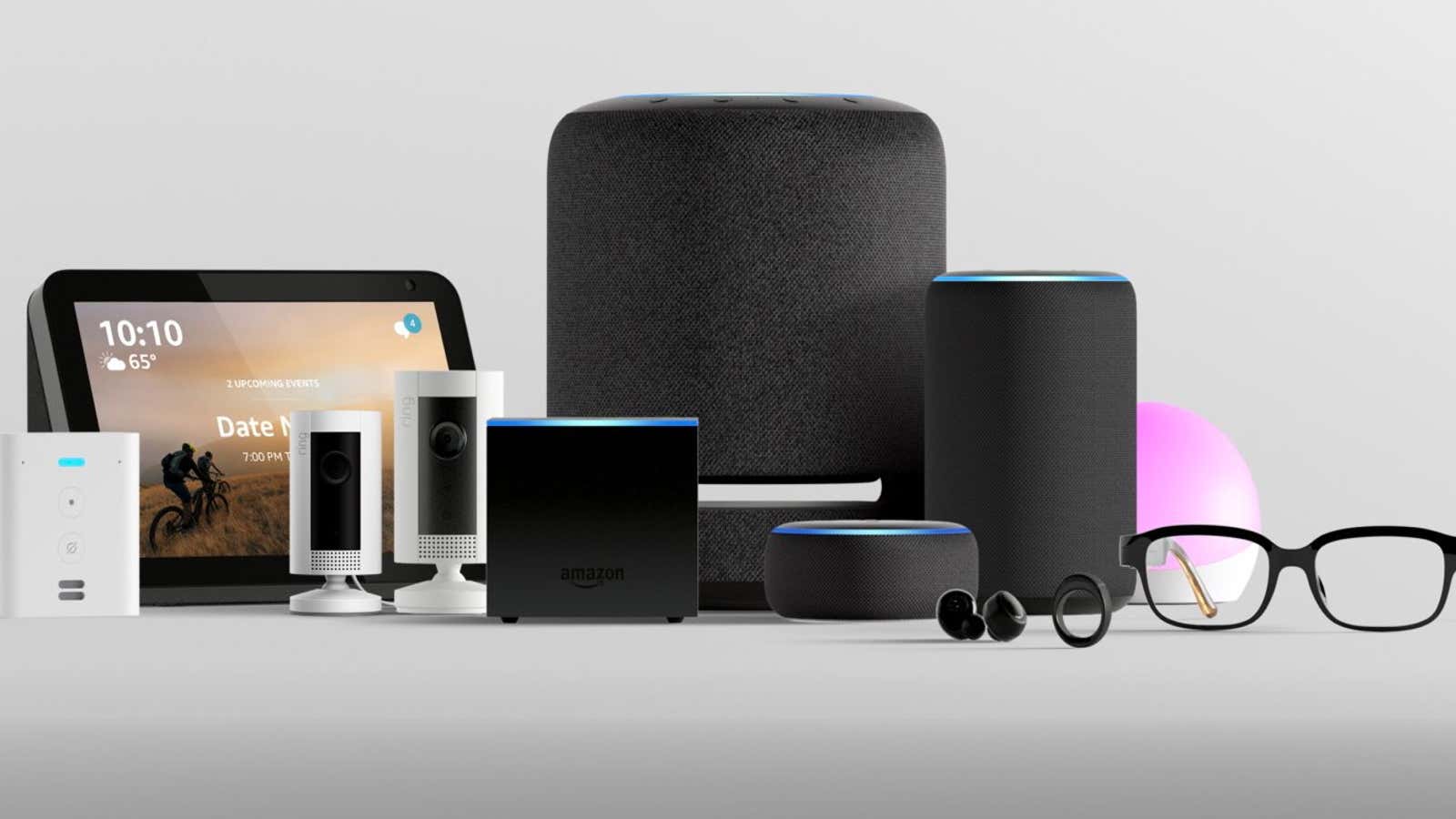At an event at its headquarters in downtown Seattle, Amazon unveiled a host of new gadgets today (Sept. 25), many of which are powered by its Alexa voice assistant.
In typical Amazon fashion, the company’s hardware chief Dave Limp breezed through the announcements, launching myriad updates to existing products while also unveiling entrants into new fields, describing each with the same vigor.
Here’s a quick run down of everything announced. We’ve broken the list out into new devices, new services, and forthcoming devices:
New devices
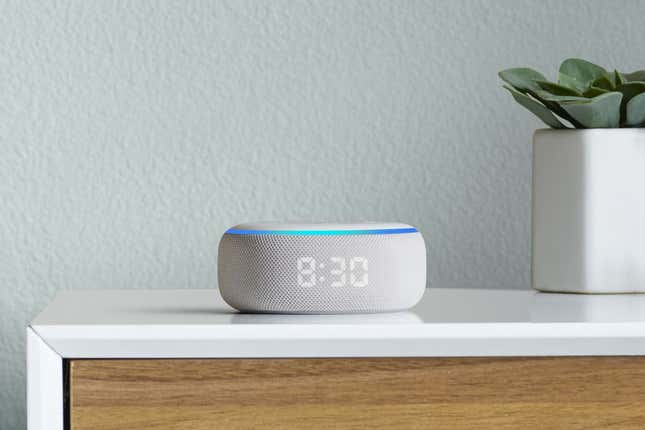
A new Echo Dot. The company’s smallest smart speaker got a small update. The device now comes with a built-in LED clock, saving users from constantly having to ask Alexa what time it is. The new Dot will cost $59.99, and is available for pre-order starting today. Amazon will continue to sell its older Dot without the clock for $50.
An updated Echo. Amazon has updated the new model of its oldest smart speaker to include the immersive sound technology found in last year’s Echo Plus speaker. The new model will still cost $99.99 and be available to preorder from today. It also comes in new fabric shades.
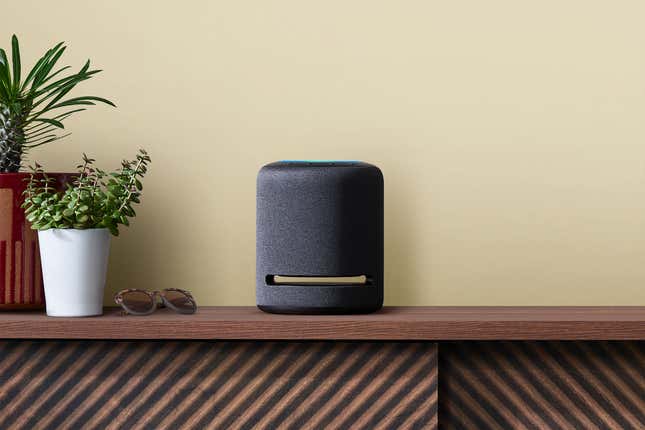
Echo Studio. This is a new Echo smart speaker focused on high-quality, immersive sound. Whatever space you place the speaker in, it will optimize its sound to fit the room, and works with Dolby Atmos to produce an all-encompassing sound experience. The speaker has three tweeters and a large subwoofer to deliver sound around a room. It’s a bit larger than existing Echo speakers, and seems squarely targeted at other high-end smart speakers, such as Apple’s HomePod and Sonos’s lineup. You can pair multiple speakers together to create stereo surround sound, as well. The Studio will cost $199.99 and is available to preorder today.
Echo Flex. Amazon is introducing a new type of Echo device for those interested in using Alexa to control their smart-home devices but not in need of loud speakers for music. The Flex plugs directly into wall sockets and can be placed around a house so that users can beckon Alexa to do their bidding wherever they are. Each Flex will cost $24.99, and it’s available for preorder today. Amazon is also selling a motion sensor and nightlight add-ons for $15.
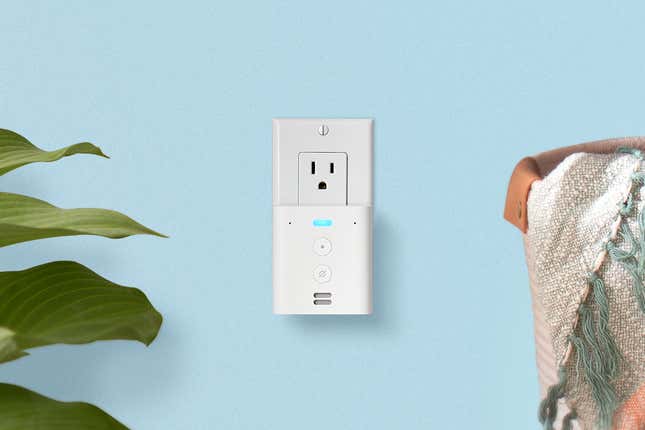
Echo Show 8. Building off of the Echo Show 10 and 5 smart display devices Amazon has introduced over the last year, the 8 is, rather unsurprisingly, an 8-inch display model that fits between the two devices in size. Like the Show 5, it has a privacy shutter to cover the camera when you’re not using it. It’ll cost $129.99 and is available for preorder today.
Amazon also announced it’s participating in the Food Network Kitchen service that launched today. The streaming service will allow you to watch interactive classes and recipes from famous Food Network chefs on demand, and Echo Show devices will exclusively be able to ask Alexa questions while watching, such as how many chicken breasts a recipe you’re watching calls for, and to save the videos to watch later.
Echo Glow. This is effectively a $29.99 nightlight that kids and adults can control using Alexa.
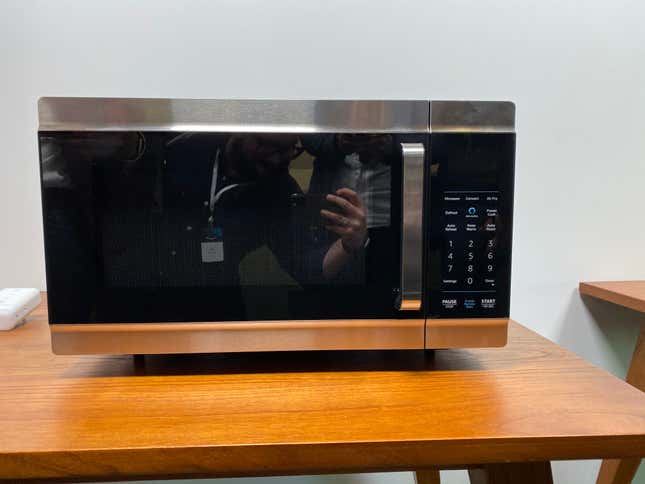
Amazon Smart Oven. Limp said onstage that the Echo microwave, unveiled at last year’s event, rather surprisingly became Amazon’s top-selling microwave on its site. It decided to build on that popularity by releasing a smart oven that adds a convection oven, an air fryer, and food warmer to the microwave. Using the Alexa app, users can also scan product codes on prepackaged goods from Whole Foods, and the oven will know exactly how and for how long to cook them. It also comes with a temperature probe and Alexa functionality. It’ll cost $249.99, with an Echo Dot thrown in for some reason, and is available for preorder now.
A new eero router system. Amazon’s mesh wifi router company eero got some time onstage to unveil its most affordable router yet. The new model will cost $99 (a pack of three will cost $249), and aim to be as easy to set up and monitor as all its existing devices. The firm also announced that it’ll be expanding into other countries, offering eero devices in Canada, Germany, France, Italy, Spain, and the UK in November.
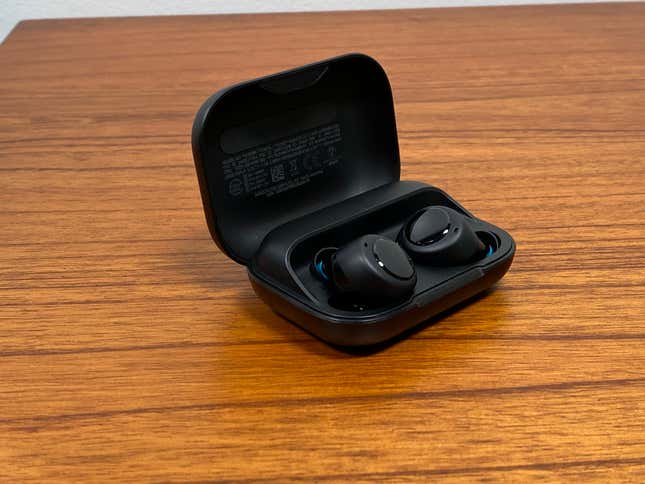
Echo Buds. Amazon is jumping into the smart earbuds race. Looking pretty similar to many of the wireless earbuds on the market (barring Apple’s), wearers can ask Alexa questions when paired to a smartphone, as well as take calls, listen to music, and do just about everything else you’d expect on earbuds. You’ll even be able to ask Alexa where products are in Whole Foods as you peruse the aisles. Amazon said they’re safe to run with or wear in the rain. The company said it worked with Bose to build the noise-cancelation technology in its new earbuds, which can be turned on and off as needed. The earbuds have roughly five hours of battery life, and the case houses an additional 15 hours. They can recharge for two hours’ use in just 15 minutes. The Buds will cost $129.99, around the same as Apple’s and Samsung’s offerings, and are available for preorder now.
Ring retrofit alarm kit. If your house has an alarm system hooked up to doors and windows that you no longer use, you can connect Ring’s new box to the hub, allowing the sensors to link up to your Ring security system. Users will reportedly be able to set it up themselves, and the device will cost $199.
Ring stick-up cam. The new camera can be used indoors or outdoors, wired or wirelessly, and will cost $99.99.
Ring indoor camera. Ring’s first indoor camera competes more directly with other smart-monitoring services like Google’s Nest and Canary. It stands at about three inches and can be mounted on a wall or table. It costs $59.99, well below many competitors’ products.
New services
Delete it all. Limp said onstage that “privacy is foundational” to Amazon, and five years after the launch of the first Echo, users will soon be to ask Alexa to delete the history it has on them. You’ll be able to say, “Alexa, delete what I just said,” and “delete everything I said today.” You’ll also be able to set up Alexa to auto-delete anything you say to it.
More clarification. Alexa doesn’t always do things as you’d expect it would. You’ll soon be able to ask it what it just heard you say to it and correct it as needed, and ask it why it did something, such as turn on a light you didn’t ask it to.
Frustration mode. If Alexa gets your request wrong, it’ll now be able to detect if you’re frustrated with the incorrect answer when you respond to what they said. Alexa will say something like, “I’m sorry, I must have misheard,” which seems like a rather problematic dynamic to set up with men potentially being conditioned to yell at a female voice when it doesn’t exactly do what they want.
Multilingual support. Many households don’t speak just one language, but up to now, Alexa has only been able to be set to respond to one language at a time. Amazon will soon allow for multilingual requests, such as Spanish and English in the US, and French and English in Canada, on Alexa-enabled devices.
A more natural Alexa voice. Amazon has been working on the AI technology that allows Alexa to speak to make the its voice sound more natural and less stilted. It’s also going to be using the same technology to bring celebrity voices to Alexa. Using just a bit of prerecorded speech, Alexa will theoretically be able to mimic any voices that are fed into its new system. First up, Samuel L. Jackson, who will soon be available as the voice on the other side of your Echo for $0.99.
Alexa Guest Connect. You’ll now to be able to use your Alexa settings at someone else’s house. The new setup will allow friends to let each other connect to their Alexa settings from their Echoes, like their music playlists. Each user will just have to authenticate that they’re happy to share Echoes. This could be useful for Airbnb rentals.
Alexa Hunches. The smart assistant will now be able to tap into the knowledge of other smart devices and tell you about them. If you’re printer’s running low on ink or a gadget will need a charge soon, Alexa will be able to notify you without asking.
Alexa Communications for Kids. If your child and their friends both have Echo Dots, you and their parents will now be able to set up an authenticated service where the children will be able to call each other through their Dots whenever they’d like, rather like every kid in every 1980s movie does with walkie-talkies. Both parents will have to agree and set up the service through the Alexa app.
Alexa Education Skill API. Alexa is about to annoy a lot of kids. Amazon will be partnering with major education software providers that many schools use, such as Coursera and Canvas, to allow kids (and their parents) to keep up-to-date on schoolwork. Soon, kids will be able to ask Alexa what homework they have to do that evening, and parents will able to ask how their children did on tests in school. No more hiding the report card from mom and dad.
Wifi management. If kids weren’t enraged enough, Amazon is also working with major wifi router manufacturers, such as its own eero, TP Link, and Linksys, to allow Alexa to turn off wifi access to specific devices. In the near future, parents will be able to say something like, “Alexa, turn off wifi for Sam’s Playstation 4,” and a very annoyed Sam will be without gaming for as long as their parents want.
Ring answering service. Soon, Alexa will be able to answer your Ring doorbell for you. If you’re out or don’t want to answer the door, Alexa will be able to ask who’s calling and if they want to leave a message. It’ll then send the message to any Alexa-connected devices, and presumably freak out whoever’s decided to drop in on you unannounced.
Alexa Smart Screen 2.0. Amazon is introducing a new version of the software that can turn connected displays into Echo screens. First introduced on Facebook’s new Portal devices last week, it’s supposed to allow third parties to build similar experiences to those available in Echo Show devices in their own products.
Certified for Humans. Amazon is working with smart-home companies to introduce a new label for products that it feels have a “frustration free setup,” where users can easily connect new gadgets to wifi, and they’ll update themselves without any steps required by the owner.
Alexa Guard. Amazon’s technology that notifies Echo owners when there’s the sound of breaking glass or a fire alarm has a new feature. Using AI, the devices are now supposed to be able to determine when there’s “human activity” in a user’s house and alert them.
Amazon Sidewalk. The company unveiled a new, proprietary communication technology. It’s a low-bandwidth mesh connection protocol, called Amazon Sidewalk, that will theoretically allow people to track things anywhere and communicate across the web of connected devices. Like a distributed internet, but running on Amazon technology.
Fetch. The first device that will run on Sidewalk is called Fetch, a small tag for dogs that sits on their collars. It allows the owner to geo-fence their yard (or wherever the dog is allowed) and track them if they go astray. It’ll be available next year.
Future devices
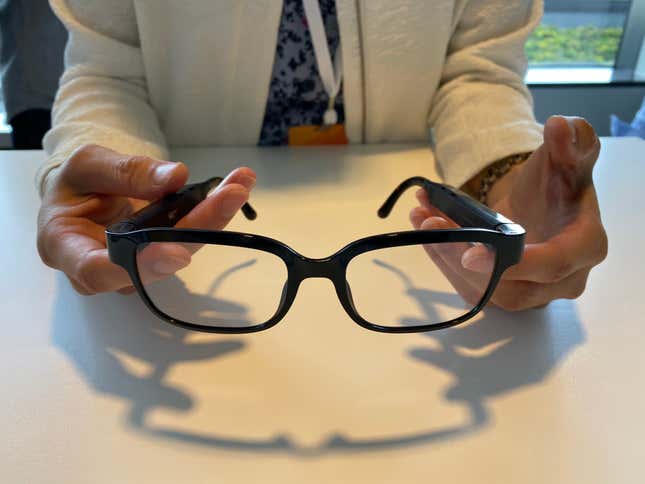
Echo Frames. Amazon unveiled smart glasses that connect to the wearer’s phone and allow them to access Alexa wherever they are. The glasses have a proprietary technology that directs audio into the wearer’s ears, while still allowing them to hear the world around them. Anything you’d usually ask Alexa will be available through the glasses, and Alexa will be able to take calls, and notify you of important things that you can set up in the app. There’s no display in the glasses, nor is there a camera—Amazon said they’re mainly just meant to augment your life without taking you out of it. A representative told Quartz that any optometrist should be able to cut and insert prescription lenses without any more hassle than they would any other pair of glasses.
Even in the loud, bustling demo room, I was able to ask Alexa for the weather in Seattle, and hear the assistant’s response. The frames are extremely light, but still have a battery life of about 14 hours. The frames will soon be available, by invitation from Amazon, for $179.99.
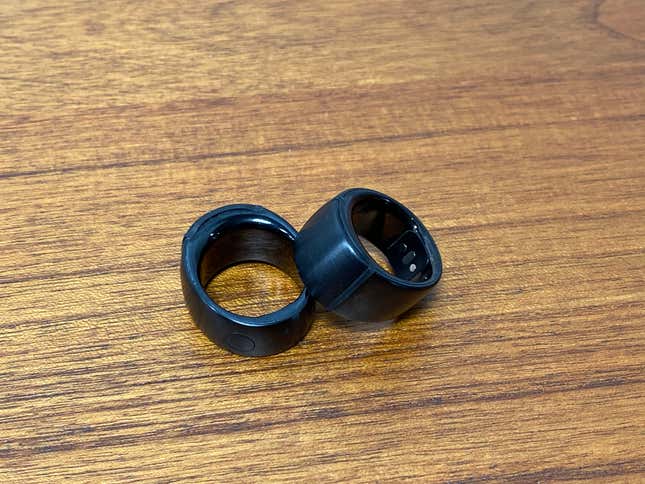
Echo Loop. If you’re not into wearing glasses, Amazon has another new idea for you. It’s going to introduce Loop, a smart ring that has a microphone and tiny speaker built in. Click a button and the ring will vibrate, letting you know you can ask Alexa a question. You then hold the ring up to your ear, rather like you’re taking a call on an invisible cellphone, and Alexa will respond. The ring pairs to a smartphone, and was able to hear my question well in a crowded room. It was pretty difficult to hear Alexa’s response, though.
The ring will come in four sizes, although the largest Amazon is offering only fit on my pinky finger. The device, like the glasses, will soon be available by invitation only, and will cost $129.99.
